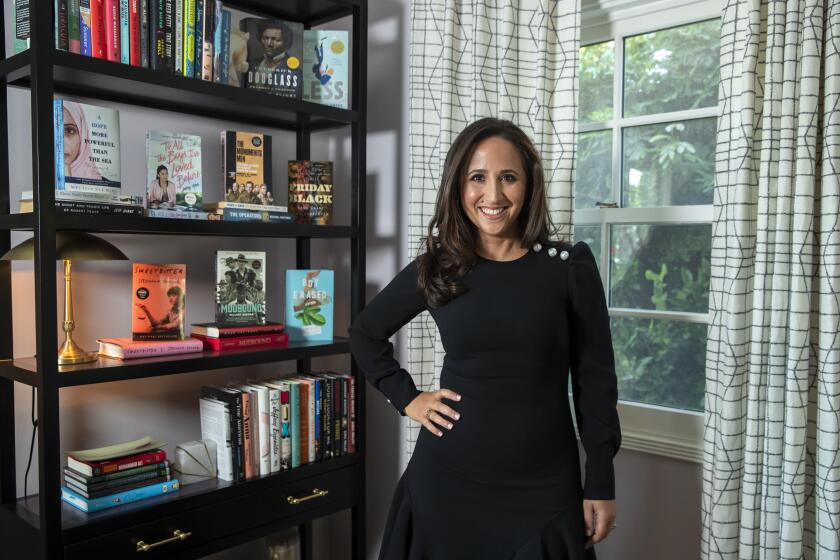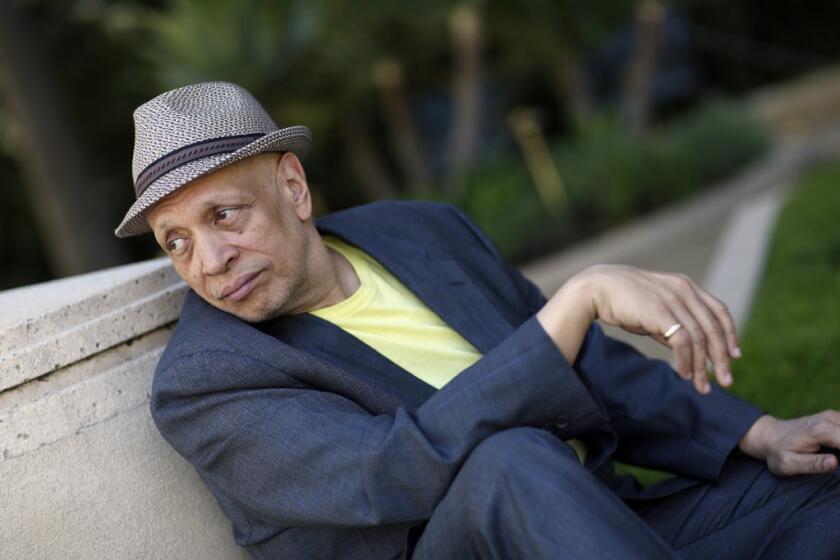Novelists are writing for TV more than ever. How it’s changing the industry
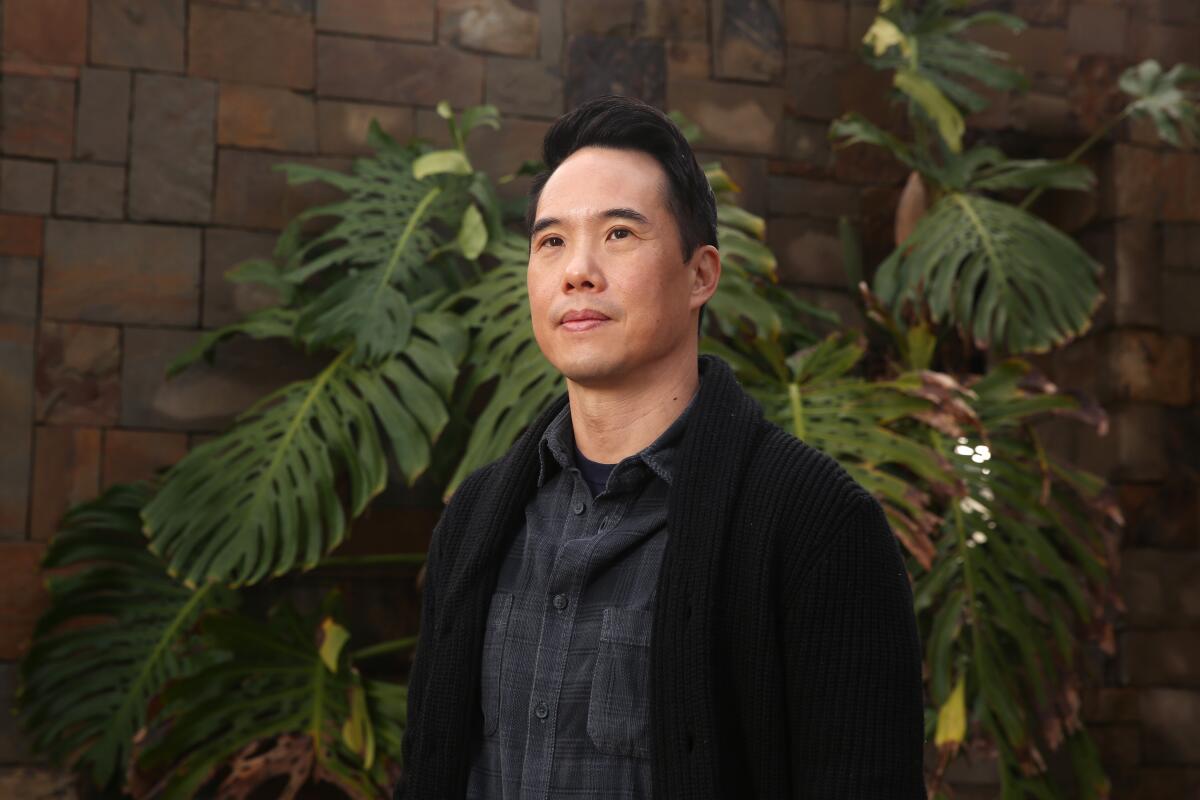
- Share via
In 2013, Sheri Holman had just turned 47 and her life was falling apart.
Raised in Virginia by a struggling single mom, Holman had bootstrapped herself through college to earn a theater degree, then moved to New York City to pursue acting. When that plan proved unworkable, Holman took a series of temp jobs in publishing, eventually becoming an assistant to an influential literary agent.
Throughout the early 1990s, when book advances were soaring, Holman wrote her first novel, “A Stolen Tongue.” Published to raves in 1997, the book built an audience for her 2000 bestseller, “The Dress Lodger.” In 2003, Holman’s “The Mammoth Cheese” was a finalist for the Orange Prize. Secure in her work, she married a good guy with a real job. They bought a Victorian house in Brooklyn, had a daughter and then twin sons. Holman quit her job to write novels and mother full-time.
Slow-forward five years. One of Holman’s sons was battling cancer. Her marriage was over. Her third book was taking forever to complete. “Witches on the Road Tonight” was finally published in 2011, to disappointing sales, with the book advance money long gone.
Changes in TV, film and book publishing, including the pandemic, have driven a boom in book adaptations. Here’s a guide to the pipeline.
“My editor broke the news to me that publishers’ profits, and therefore advances, were down, so most novelists were going to need two jobs,” Holman recalled. “I’d earned $9,000 on my writing the year before …. I needed one job that paid enough to live on.” Then she heard from a novelist friend who’d moved to L.A. and was making “big bucks” in an HBO writers room. “I decided to teach myself to write for TV.”
Lacking a trust fund, savings or income, Holman sold the Victorian and squeezed her brood into a small, rented flat in a less gentrified neighborhood. There her vocational retraining began. “I spent 2013 watching and rewatching the pilot for ‘Six Feet Under,’ with my iPhone stopwatch marking every beat change,” Holman said. Using that template, she wrote a pilot based on her previous novel. It took 15 months to get it right.
In February 2014, NBCUniversal bought Holman’s pilot. With three days notice, the network flew her to Los Angeles for her apprenticeship: an entry-level spot in the writers room of a series called “Emerald City.” And just like that, Holman the novelist became Holman the TV writer.
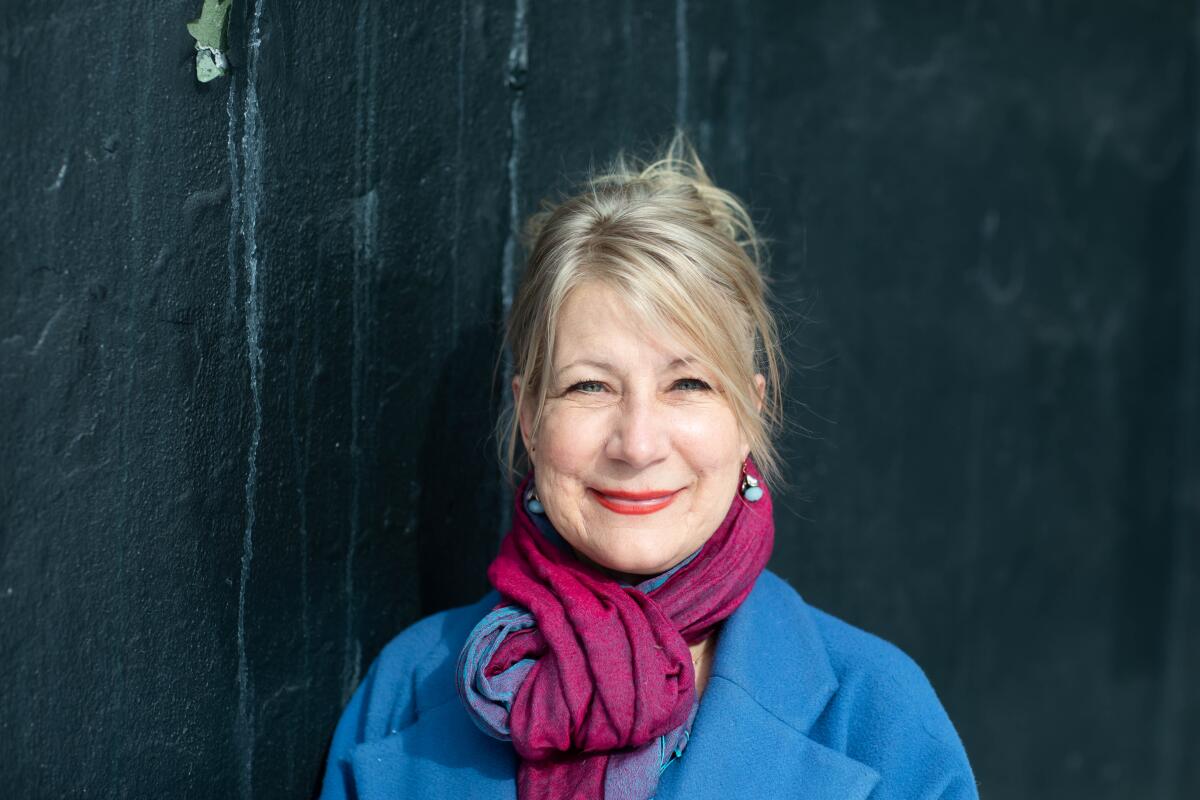
As the financial rewards of writing books shrink and the need for streaming content continues to grow, more and more novelists are doing what Holman did, expanding their skill sets and their incomes by moving from page to screen (or writing for page and screen). In recent years, novelists have been warmly welcomed — in some cases, energetically recruited — into TV writers rooms. And as much as publishing has changed in the past two decades, television has changed even more.
“When I came into network TV in the 1990s, the execution of every show was baked in,” said veteran TV producer, director and writer Tom Spezialy, best known for his work on “Desperate Housewives” and “The Leftovers.” “The writer’s job was to make the script 90% familiar and 10% something new. Back then, all TV was network TV, and all network TV was formulaic. TV shows were plot-driven, not character-driven like novels. So the networks bought novels, not novelists; then they hired TV writers like me to translate those novels for the screen.”
The shutdown in production and the streaming services’ insatiable appetite for new I.P. has led to a surge in sales of film and TV rights for books during COVID-19. That has been a boon for agencies.
In the tradition of Hemingway’s advice on dealing with Hollywood — drive to the California border, throw your book over the fence and take the money Hollywood throws back — novelists were thrilled to cash the checks that TV producers were happy to write.
What changed? In a word: cable. The emergence of HBO original programming — beginning with “The Sopranos” in 1999 — set down a gauntlet for high art on the small screen, for prioritizing character over plot, for genre storytelling with literary flair. Eventually, along came “Breaking Bad” and “Mad Men,” harbingers of the current era of glossy abundance, when even campy fare like “You” — itself based on a series of novels by Caroline Kepnes — comes dressed in bookish garb.
And who better to write novelistic television than novelists? Suddenly showrunners needed authors like Holman, skilled at creating complex contemporary characters. In exchange for a steady income, L.A. winters and health insurance, novelists were willing and able to learn the tricks required to do the TV writer’s job: how to share authorship in a writers room instead of dreaming up stories in solitude and how to spin a tight 42-minute arc instead of a meandering 400-page narrative.
“Screenwriters rely on behavior and image to communicate inner life,” said Dave Andron, showrunner of “Snowfall,” FX’s blistering depiction of the L.A. crack epidemic. “Novelists can tell you exactly what’s going on in a character’s mind.” TV, as we now know it, needs both.
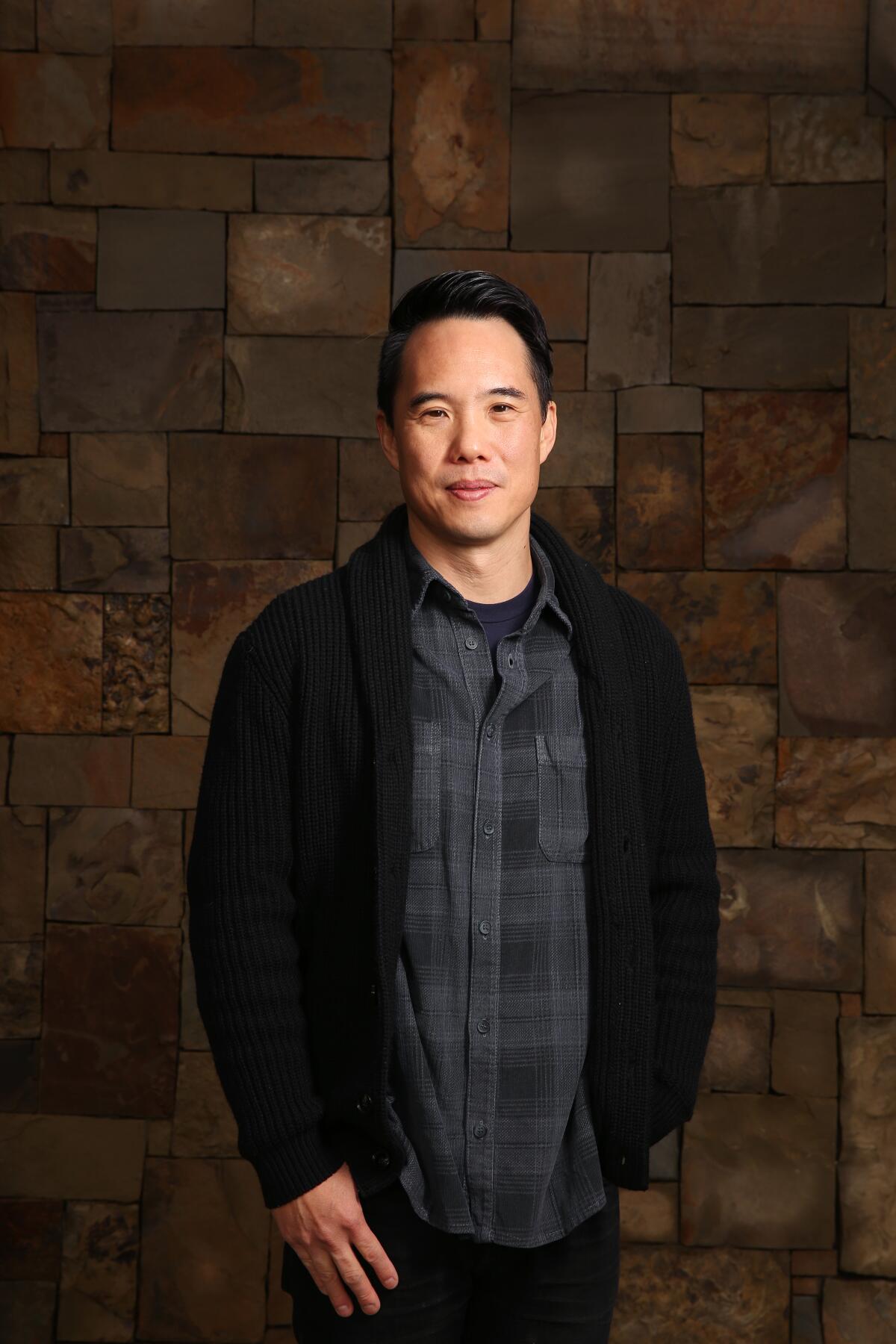
In 2014, Charles Yu was working 18-hour days as in-house counsel for a Los Angeles tech firm, supporting his wife and two kids while writing on the side — successfully. At 38, he’d published two short story collections and a novel. When he was midway through drafting his second novel, “Interior Chinatown,” he learned he had important fans; the showrunners of HBO’s “Westworld” liked his fiction and wanted to interview him for a staff writer position. When Yu explained that he already had two full-time jobs, the showrunner said, “You should be writing full-time.” That was Yu’s last day as a lawyer.
“It still feels like a dream,” Yu said. “One day I’m an attorney. The next day I’m in a writers room in Burbank, eating free snacks and talking about robots and consciousness.”
To say the move worked out is an understatement. Yu has continued to work on TV series, from “Sorry for Your Loss” to “Here and Now.” As for “Interior Chinatown,” that novel he was working on, narrated by a Hollywood extra? It won the 2020 National Book Award for fiction.
Steph Cha shares a meal and some notes on performing identity with the “Interior Chinatown” author.
For Yu, this isn’t just creative success on parallel tracks but a single career in which one medium feeds the other. “I find myself trying to import skills and tools from scripts to novels and back again,” he said. “From TV I’ve learned about structure and outlining and how to thread multiple storylines through a longer work. Going in the other direction, I try to find ways to incorporate my voice, my tone and a sense of being experimental from my books into my TV projects.”
While Yu considers himself lucky, he also acknowledges the pressure of representing his ethnicity in both worlds. “Although I haven’t experienced overt discrimination in TV, in the six writers rooms I’ve been in, I’ve been the only Asian American writer.”
In his fiction, and in essays like a Time piece headlined “What It’s Like to Never See Yourself on TV,” Yu tackles the pitfalls of tokenism. “Interior Chinatown” cuts right to the heart of that question. Soon he will adapt the novel for Hulu, bringing his point of view before the masses. “Since I don’t write huge bestsellers,” he said, “television gives me a much bigger audience for my message.”
The size of that audience is what moved Walter Mosley into TV writing. If there was a typical TV writer, which there isn’t, Mosley wouldn’t fit the profile. For starters, he’s 68 — as he puts it, “the oldest guy in every writers room.” Twenty-five years before Andron and John Singleton recruited him to write on “Snowfall” in 2014, Mosley was selling his novels to studios for screenwriters to adapt. “People ask how I feel about what Hollywood has done to my novels,” Mosley said. “I say, Hollywood hasn’t done anything to my novels. My novels are right here on the shelf.”
Another atypical thing about Mosley: he’s African American. A 2017 study of writers rooms found that 91% of showrunners and 86% of TV writers are white, while only 31% of white showrunners employ Black writers.
Unlike Holman and Yu, Mosley doesn’t work in television to underwrite his publishing career. “I’m not John Grisham,” he said, although he kind of is. He’s published more than 60 works of fiction and nonfiction, including 15 bestsellers, since he started writing one or two books per year at 34. “But I was doing fine just writing novels. Every once in a while, a producer has ideas I don’t find wonderful and I stop working with them.”
So why does Mosley bother with television writing at all? “TV is a far better delivery method for a social justice message than a book. For every 10 people who read one of my novels, a thousand people will watch one of my shows. My hope is, maybe a show will get them interested in my books. People watch TV and forget it. They don’t forget books.”
Welcome to Easy Rawlins’ world: a Q&A with Walter Mosley
Mosely said he learned to love TV writing from Singleton, his friend and mentor, who died in April 2019 while shooting “Snowfall’s” third season. “He wanted to talk about his community, his neighborhood, his people — to tell those stories as truthfully as he could.”
But Singleton was also realistic. “John understood the limitations of TV. You write the novel you want to read. But you have to write a show that a whole lot of people want to see. You have to try to get deeply into an idea in a room full of people with different points of view. John put a lot of people of color in the ‘Snowfall’ room — people who understand the issues of the show.”
Every morning now, Mosley sets his alarm for 5 a.m. and goes to work on his latest novel-in-progress. At 10 a.m., he logs into his writers room. “No matter how I spend my time, I’m still a novelist,” he concludes. “That’s what makes me happiest.”
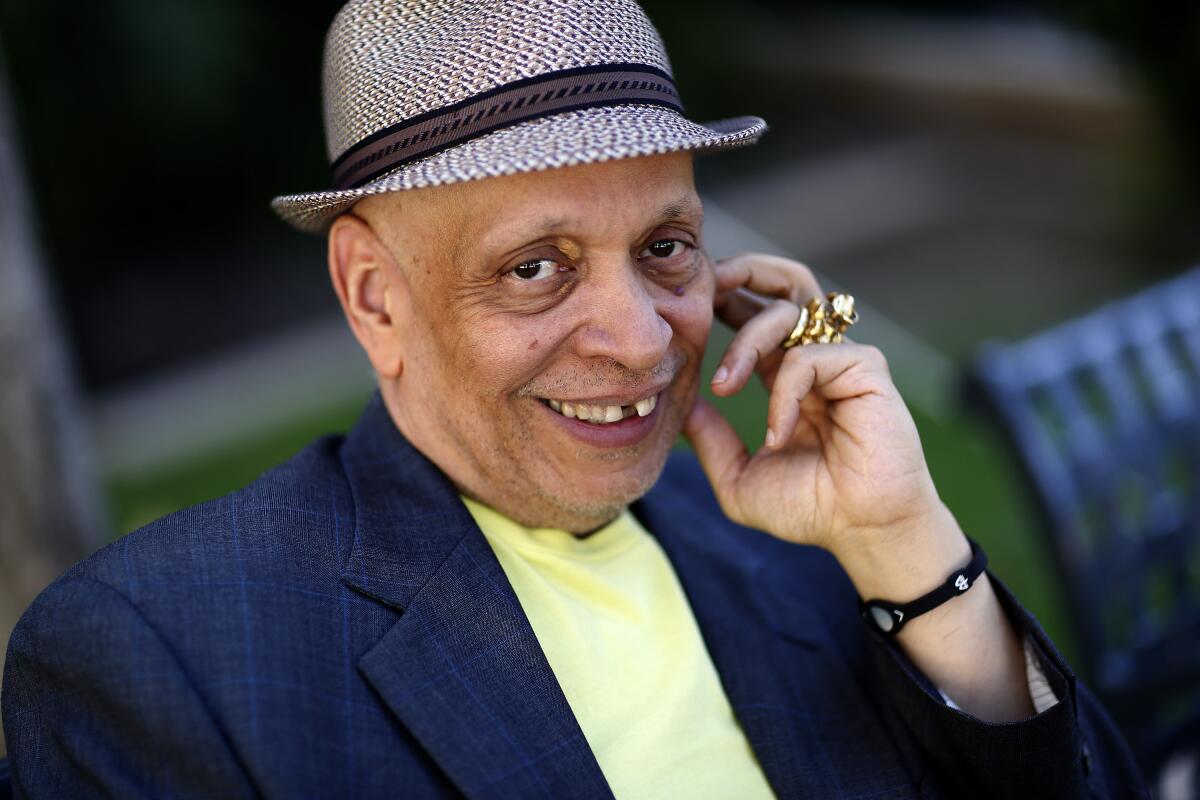
Yu, Mosley and Holman all relied on luck or recognition to infiltrate TV writers rooms and on-the-job training to succeed in them. For the next round of transplants, the transition might be easier. As the novelist-TV-writer path becomes more traveled, it’s also becoming more professionalized. Since 2018, a select few of these crossover authors have been trained in a television writing program associated with the prestigious Iowa Writers’ Workshop.
“We’ve had graduates living in Los Angeles, working successfully in TV, for decades,” said Lan Samantha Chang, the workshop’s director since 2005. “Now the university is making a more conscious effort to put students interested in television writing in touch with these alumni. For example, our alum Sarah Heyward wrote the episode of ‘Girls’ in which Hannah attends the Iowa Writers’ Workshop.”
Does Chang, a fiction writer herself, see the course as benefiting the writers’ books as well? “I see it happening more often the other way around,” she said. “A lot of our graduate students who’ve studied screenwriting or worked as screenwriters are yearning to become novelists. They’d rather work on their own than in a writers room. They’re interested in creating a sense of human consciousness as it’s developed in literature, more deeply than it can be represented on TV. So they take our TV course to help them develop the novelist’s skills.”
Tom Perrotta could teach a master class in bouncing between media. Author of the novels “Little Children” and “Election,” both made into Oscar-nominated films, Perrotta saw his TV prospects soar when “The Leftovers” was adapted into an HBO series. One of that series’ lead producers was Spezialy. Recently, the two Toms collaborated on adapting Perrotta’s latest novel, “Mrs. Fletcher,” also for HBO.
“Most of my screenwriting work has been collaborative, which is nothing like the solitary labor of novel writing,” Perrotta said. “It’s the difference between being a singer/songwriter with an acoustic guitar and playing in the band. The band makes a bigger sound. But there’s a lot more interpersonal drama.”
Roxane Gay, the novelist, essayist and TV writer, notes another distinction. “Working in prose has taught me about telling a complete story, and pacing, and holding the reader’s interest,” she said. “Writing for the screen has taught me about how to think visually and how to sustain a viewer’s interest across time. But even though the rules of storytelling change across genres, the essence of storytelling remains the same.”
Bestselling essayist and novelist Sloane Crosley, who has written several pilots and screenplays, sees the two modes as complementary. “It’s healthy to return to the novel from the screenwriting world, where every line is a workhorse,” she said. “It’s not a bad mentality for the novelist to have, should you ever be tempted to write an especially rambling description of summer light.”
If TV writing is becoming second nature to a subset of novelists, their presence in the room is also becoming something of a given for a younger generation of showrunners.
“I’ve had the most positive experience working with novelists in television,” said 34-year-old Kit Steinkellner, who sold her first pilot to Showtime in 2016. In 2018 the pilot became “Sorry for Your Loss,” the Facebook Watch series on which Charles Yu was a staff writer. “A novelist spends years diving deep into a character’s soul. That’s a superpower in a writers room. I’ve also been struck by novelists’ superhuman patience. With the length of time it takes to write a book, an author needs that skill to stay sane.”
Which is not to say that Steinkellner would want an entire room full of authors. “Novelists aren’t accustomed to the conversation-centric, hypersocial nature of a writers room,” she said. “But when I’m staffing a writers room, I’m looking for writing that sets my heart ablaze. If the choice is between taking a chance on a novelist whose work I love versus an established TV writer whose work and presence in the room leave me cold, I go with the novelist every time.”

Seven years and as many writers rooms later, Holman reflects on the pros and cons of her midlife reinvention. “I love the collaborative storytelling in the writers room. I love the money. The pace. The people. And this cannot be overstated: For the first time in my life, I have health insurance.”
That benefit became a lifesaver in March, when a severe case of COVID-19 left Holman fevered and gasping for breath, too weak to leave her bed. Her coverage with the Writers Guild of America paid her medical bills, which totaled thousands of dollars.
Holman’s three kids — all now hale and hearty — rallied around her, spoon-feeding her soup, changing sweat-soaked sheets and making pharmacy runs. After she recovered, Holman found that one of the hardships of the switch-hitting author’s/screenwriter’s life — the constant travel, the broken-up school years, the time apart from family — had been swept away. “All the writers rooms are on Zoom, now,” she said, “so I can go from show to show without leaving home.”
What about the pilot she sold her house to write all those years ago? Holman sighs. The show was never made. Which is one reason she still spends nights and weekends trying to finish a new novel.
“If publishing houses offered health insurance,” Holman said, “ I’d stay a novelist the rest of my life.”
More to Read
Sign up for our Book Club newsletter
Get the latest news, events and more from the Los Angeles Times Book Club, and help us get L.A. reading and talking.
You may occasionally receive promotional content from the Los Angeles Times.

